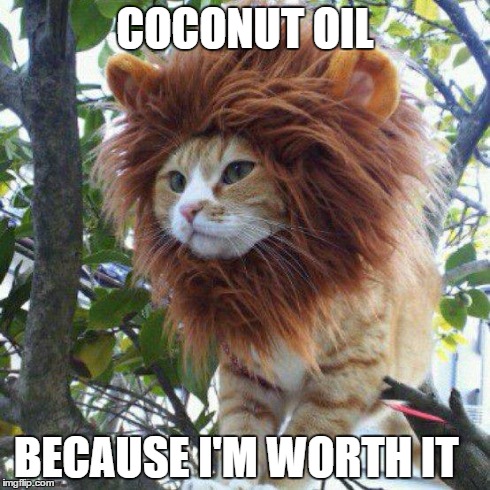Ah coconut oil, it’s the latest craze! It’s what the cabbage soup diet was to the 60’s, the Atkin’s was in the 70’s (and the 90’s), it’s is on every blog you read, ironic, I know. People claim it solves all life’s ailments. Some are anecdotal inoffensive claims; healing split ends or whiter teeth, however some are cruel and ridiculous such as curing HIV and cancer.

In my training I was taught how to think critically and how to distinguish between a falsified claim and actual evidence. These misleading articles, make vague exaggerated claims to trick people into buying their product (which is conveniently popping up on a banner at the top of the screen). Enough of a rant, a blog on that topic will be coming your way soon, but back to coconut.
My day job has me largely addressing weight management, metabolic syndrome, cholesterol and diabetes. That’s my bread and butter, if you will, so that is where my interest in coconut lies.
Epidemiological data has shown that although coconut oil has the highest percentage of saturated fat, populations who have consumed relatively high volumes of it for generations, have not had the same rates of heart disease as seen among those consuming the “Western” diet. The global interest into coconut oil comes from its high “Lauric Acid” content – 52%. This fatty acid is a medium-chain-triglyercide (MCT). It has been long established and understood that the metabolism of an MCT fat is different from a long-chain-triglyceride (LCT). Primarily they do no activate the pancreas in the same way LCT’s do, instead are primarily catalysed and metabolised by the liver. As dietitians we are aware of the symptomatic benefits that MCT fats have in pancreatitis, how MCT are the preferred fat source in many “improved tolerability” sip and tube feeds as well as in SMOF bags for TPN. So this trusted foundation of metabolic pathways was the hook I needed to pay a little more attention to the coconut craze.
Interestingly there have been lots of studies and a few meta-analyses of the use of coconut oil in improving lipid profiles – your total cholesterol, LDL cholesterol, HDL cholesterol as well as your Triglyercides, as well as it’s role in reducing visceral fat in the metabolic syndrome.
The studies I have read, which I list at the bottom, have been largely consistent and the conclusion I have taken away from them is that the use of coconut oil has shown some statistically significant results in reducing the waist circumference irrespective of weight loss in obese/overweight men with waist circumferences in the “at risk” reference range. The results regarding the lipid profile have been less consistent, these studies theorise that the benefits on the lipid profile may require a longer intervention period and may improve in time as a result of reduced waist circumference. Unfortunately the results for waist reduction in women were not always statistically significant, although sizable reductions in waist circumferences were seen. One possible explanation for this may be that, as a whole men tend to store a greater proportion of weight in the central region, therefore there was increased consistency in the weight loss area. Women, however, vary greater in being all kinds of wonderful pear, apple, hourglass shapes – for more info see any women’s magazine ever, this may account for the variance in weight loss areas.
So I guess it’s a case of watch this space, the use of coconut oil or MCT oils hasn’t been addressed by governing bodies such as NICE in regard to metabolic syndrome. Olive oil remains the oil of choice for cardio protection. If you do decide, for whatever reason to try out coconut oil, you will be spoiled for choice. If, like me, you live in a multicultural area, you may find that shopping in some ethnic foods stores could save you a small fortune, compared to any high street health food shops, you may even pick up some interesting recipes…if you do be sure and post them below!
Don’t just take my word for it, some studies that you may want to read…..
http://www.researchgate.net/profile/Kamsiah_Jaarin/publication/264676240_EXPERIMENTAL__CLINICAL_CARDIOLOGY_How_to_reference_Potential_Role_of_Virgin_Coconut_Oil_in_Reducing_Cardiovascular_Risk_Factors_Experimental__Clinical_Cardiology_Potential_Role_of_Virgin_Coconut_Oil_in_Reducing_Cardiovascular_Risk_Factors_Original_Article/links/53eb25ac0cf28f342f450961.pdf http://www.ncbi.nlm.nih.gov/pmc/articles/PMC3226242/ http://www.ncbi.nlm.nih.gov/pubmed/25636220